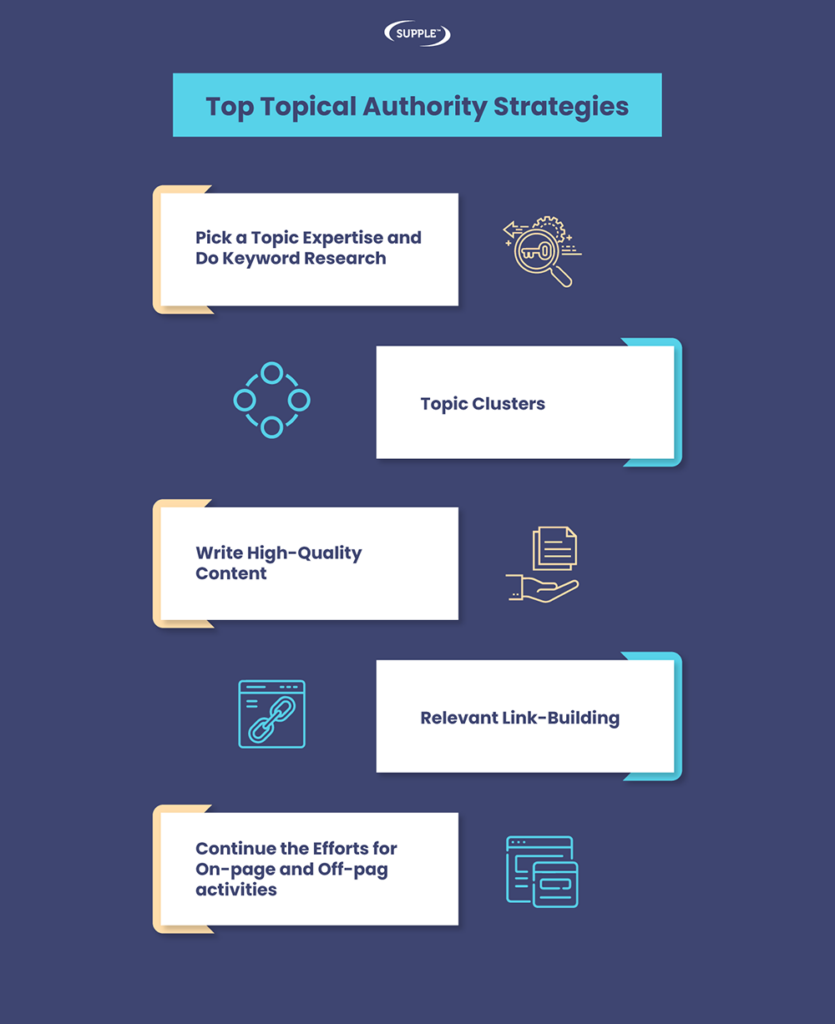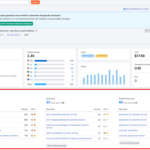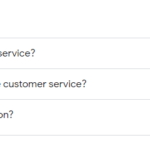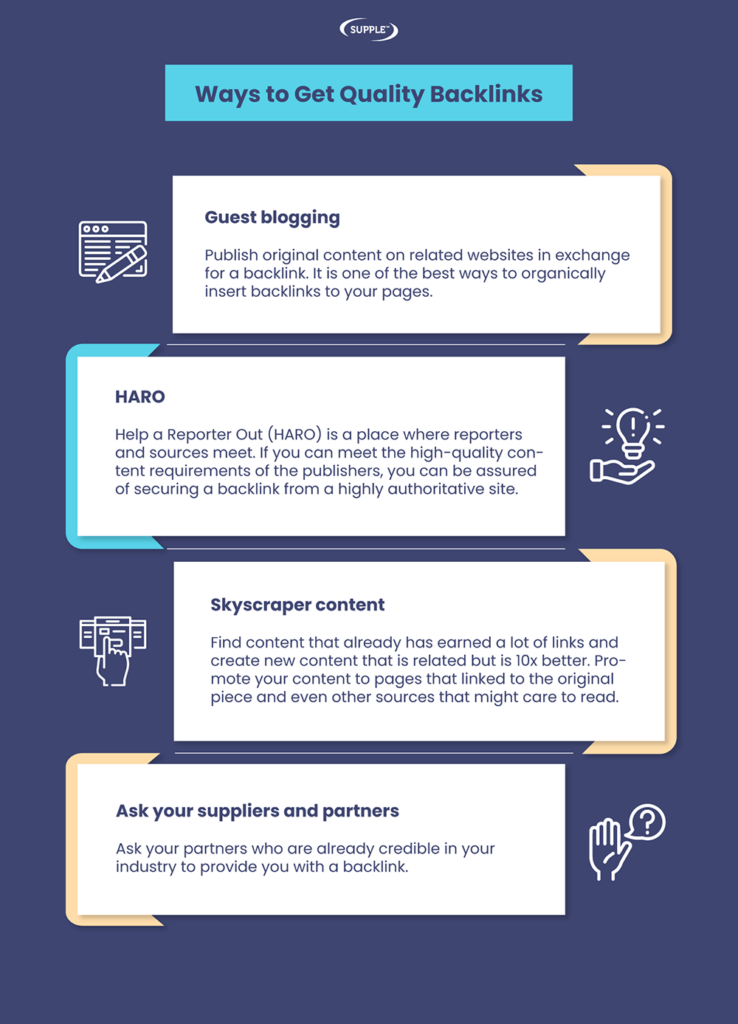Topical Authority: Definition, Importance, and How to Earn it
Topical authority is the ultimate SEO dream for many business owners.
After all, every website strives to emerge as the one-stop destination for a particular topic.
Directly or indirectly, all your SEO goals are directed towards establishing a trustworthy presence on search engines for a particular niche.
But as a term, topical authority has gained a lot of momentum on the organic SEO front.
In this guide, we take a look at what exactly topical authority is, how you can build it, and why it’s an important component in the SEO checklist.
What is Topical Authority?
Topical authority is an SEO activity that involves establishing credibility and expertise on one or more topics online. It is how search engines determine the importance of a particular webpage. Put it simply, topical authority will ensure that Google or any other search engine understands the website’s niche so that it can rank them for its topical-related keywords.
For businesses and users, developing topical authority is the process of your website becoming a go-to place to get information about a particular topic because of its trustworthiness. The more valuable and informative your content, the more likely your website becomes a trusted source for relevant topics and keywords.
Importance of Topical Authority
Companies has always strived for thought leadership and uplifting their value through knowledge-sharing. The transition to the internet and websites hasn’t changed that. Consider going to a brick-and-mortar store and having a trusted salesperson answer your questions that can range from across the industry and not just about the product.
You’re already half sold then. Because you get a sense of understanding that the salesperson knows what they’re talking about. They understand your challenges and offer solutions for it.
On the online front, consider topical authority as that passionate salesperson. Through valuable content, you can nurture and cover a range of articles on a particular topic rather than covering a range of topics that aren’t relevant to your industry. You take time to build awareness, publish relevant content with targeted keywords and ultimately to establish a loyal reader base.
To establish topical authority, you require the additional factor of having well-researched, and verified content from trusted sources. Expert-led content is one of the prime examples of this strategy.
This is how Google also identifies who’s trustworthy and knowledgeable in your industry. When you create high-quality content pieces on the same subject matter along with following the best SEO practices, your topical authority on search engines naturally increases.
For Google, topical authority fulfils the objective of providing the most valuable results for user queries. It is also in line with Google’s helpful content update which prioritises accurate and helpful information that matches the searcher’s expectations.
With topical authority, your brand can:
- Increase organic traffic
- Increase backlinks to websites and webpages
- Increase brand reputation and establishes thought leadership
Regardless, you should keep in mind that setting up topical authority for your website is a gradual process. We’ll take a look at how you can achieve it later on in this article. But once you reach the pinnacle of topical authority, it drives your SEO more than the SEO will drive your brand online.
How Does Topical Authority Work?
Topical authority came into being in SEO when Google introduced the Hummingbird update in 2013. Although before that Google had made a name for itself in the search engine domain, its algorithm was still in its infant stage. Keywords and backlinks were a critical SEO ranking factor and context had little to no importance.
With the Hummingbird update, Google refined its algorithm to rank content on context and relevance rather than just keywords and the importance of entity-based SEO grew. While keywords are still important, it’s the reasoning behind those keywords that Google takes into account while prioritising search results.
There is no defined explanation of how topical authority works. But as a webmaster striving to achieve it, you can keep in mind the E-E-A-T (expertise, authority, and trustworthiness) formula while designing your content strategy. It is what Google uses to evaluate the quality of the content on the internet.
E-E-A-T is a part of Google’s algorithm and Search Quality Evalutor Guidelines and suggests that for a content piece to be termed as ‘high-quality’, it needs to have certain characteristics that makes it such.
It just suggests that to become a subject matter expert to achieve topical authority, you need to consider the
- Experience of the content creator
Google is increasingly putting it’s focus on understanding the face behind a particular piece of content. If the author demonstrates first-hand experience along with its other accomplishments, it improves the searcher’s experience and also increases the credibility of the content.
- Expertise of the content creator
Are the authors publishing articles fit to give out strong opinions? Do they have the credibility and credentials? Are they expert on the topic?
- Authority of the content creator and the website/domain
The authority of the creator and website refers to the reputation your site holds in the industry. The Google quality raters consider the authority of the content creator, the domain authority, and the end-content itself to establish the authority in E-E-A-T.
- Trustworthiness of the creator, and the website/domain
Do other influencers and experts see your website as an important source of information about a particular topic? Quality raters consider these parameters to consider the authority of the creator, the domain authority, and the end-content.
Understand that E-E-A-T is not a direct ranking factor but helps Google improve its algorithm over time. It helps Google authenticate websites with sensitive and highly valuable information. People these days use search engines from something as basic as finding a recipe to checking their disease symptoms.
Some information posted on such articles can be completely illegitimate and pose a risk to the searchers’ happiness, health, financial stability and so on. Google clubs these topics as YMYL (Your Money or Your Life).
In such cases, E-E-A-T algorithm aids Google in filtering out low authority webpages as Google prefers its users to surf sites that have the required expertise to guide them.
As you follow the E-E-A-T protocol throughout your topical content strategy, Google starts viewing your website as an expert resource and you have higher chances of ranking at the top.
What are the top Topical Authority SEO Strategies that can help you Rank higher?
Now that you know the ‘why’, we will now discuss the ‘how’ — how do you build topical authority for your brand’s website?
As mentioned above, building topical authority is an eventual process. But it’s an intricate one. It all depends on how strategically you design your content and diligently follow the hygiene SEO activities. Here are some of the ways you can start.

1. Pick a Topic Expertise and Do Keyword Research
Every content strategy starts with picking up a topic. Remember that you want to start by building trust and that starts by covering all the relevant topics in your industry. The selection of your topic is dependent on the search intent and your industry expertise. You need to consider the broader spectrum of audiences that range from the top of the funnel to the bottom of the funnel.
Whenever someone searches for a topic, they’re clear about what they’re looking for. Your content needs to be valuable enough for the users and if it doesn’t address the search intent, it makes it less authoritative. This process is called keyword mapping, and will save you a lot of time and resources down the line.
Some of the ways you can determine search intent are:
- Using keyword research tools. Identify topics by searching what terms your buyers are typing in Google. Type in the seed keyword (phrases that you use as a starting point in your keyword research) or topic and see what kind of same and related queries are suggested by the tool.

- When using a tool like Keyword Explorer by Ahrefs, you can consider doing competitor keyword research as well and look at what pages they’re ranking for. Look for different questions and traffic share by domains to know which websites are getting the maximum traffic on your current seed keyword.
- On the search result pages, you can check out the PAA (People Also Ask) section which shows the related questions the audience is searching for. For example, say you’re a SaaS brand that provides a customer service automation tool. You can go to Google and type in terms like —
Customer service automation benefits
Customer service automation examples,
Customer service automation process, etc
Now check out the PAA section on the search query “customer service automation example”

- Hop on to sites like Quora or Reddit and see what are the top topics your community is discussing about. You get to step in the shoes of your target audience and get an informed understanding of the kind of content they’re seeking.
2. Topic Clusters
One of the best tactics to work on your topical authority is to abide by the pillar-cluster strategy. Topic clusters are interlinked content about the same topic. From the SEO topical authority perspective, it helps Google and search engines to club similar content together so that it’s easier for users to find them.
The process of creating topic clusters starts with identifying a topic that has the potential for going in-depth in the form of sub-topics. In this strategy, you will create a pillar post, which links to multiple cluster posts on topics that can be classified as the sub-topics of your pillar topic.
Remember, your primary topic article needs to hold credibility as a standalone article as well as be able to link to the subtopic articles. The content can either range from ‘how-to’ articles to full-length guides that cover a specific topic.
Outline every piece of content that you want to create based on the search intent. Before starting the content production, you assign keywords to each pillar and cluster pieces to avoid keyword and topical cannibalization.
In our previous example of customer service automation, let’s say that through SaaS SEO efforts, you found that the top-ranking keyword and page for customer service automation is “automated customer service”. You can build your pillar article on this keyword and create subtopics on related long-tail keywords like “how to automate customer service” and “top customer service automation tools”, “Customer service DIY Marketing tools”, etc.
Once you write the content for the pillar and cluster topic, it is vital that you interlink them. Only then can search engines know that they are topically related and that there is a semantic relationship between these URLs.
3. Write High-Quality Content
Content and SEO efforts always go hand in hand. Do you want high-ranking content? Do you want topical authority? Do you want to establish a loyal reader base?
It all stems from good, well-written, and compelling content.
The goal of every piece of content should be to address a particular customer query to gain a readership.
Be sure to produce your content chronologically. Start by writing your pillar pages. These are the pages you want to build authority over and it is the topic that will require considerable research and hours to prepare.
Some of the other things to keep in mind for optimising your content and blog posts are:
- Understand your target audience while writing your content.
- Be specific and use examples
- The content needs to be unique and provide some value to the reader
- Follow the E-E-A-T protocol while developing your content
- Writers and SEO professionals need to work together for keyword inclusion and internal and external link-building within the content
- Define and diligently follow your brand tone. It needs to be consistent across all your content pieces.
- Continuously revise your content to match the new search intents and keyword requirements.
- Make platform-based SEO adjustments.
After you draft the content, plan out the best time to release the same so that you can reach your target audience at the right time in the customer buying journey.
4. Relevant Link-Building
Writing valuable isn’t enough. Every content needs to be linked and linked to relevant sources.
For example, if you’re a real-estate company in Brisbane practicing SEO, you can link to related industries that are also intensifying their SEO such as an electrician or a plumber.
However, you cannot link them to financial services or accountants that aren’t relevant to the real estate industry.
Backlinking is one of the ways search engines gauge your website authority.
For backlinking to work its magic, you need to determine authoritative and relevant sites to link to. So check the domain authority of your website from a domain authority checker before you pitch for a backlink from the same.
There are a number of ways you can get quality backlinks —
- Guest blogging: Publish original content on related websites in exchange for a backlink. It is one of the best ways to organically insert backlinks to your pages.
- HARO: Help a Reporter Out (HARO) is a place where reporters and sources meet. If you can meet the high-quality content requirements of the publishers, you can be assured of securing a backlink from a highly authoritative site.
- Skyscraper content: Find content that already has earned a lot of links and create new content that is related but is 10x better. Promote your content to pages that linked to the original piece and even other sources that might care to read.
- Ask your suppliers and partners: Ask your partners who are already credible in your industry to provide you with a backlink.
There are other numerous ways you can do link-building activities such as broken-link building, turning brand mentions into links, and publishing ultimate guides, and testimonials. External backlinking with internal links can build a lot of credibility for your site and gradually increases your topical authority.

5. Continue the Efforts for On-page and Off-page activities
Regular SEO activities uplift your website and ensure that your content is visible and matches the search queries on your topic.
You can structure a site’s metadata that helps you rank better. These are some of the practices that you already follow for SEO such as —
- Including your keywords for titles and meta descriptions
- Adding keywords in your H1, H2, etc
- Optimising page speed
- Encouraging social sharing
- Including keywords in image alt text
Your site structure should include these SEO indicators that can help it rank better and build topical authority. You can also create a sitemap to understand how the content matches the customer journey.
Establish your Topical Authority
After all is said and done, remember that for achieving topical authority, patience is really a virtue. Just like how trust building is time intensive for brands offline, it follows the same pattern online.
Topical authority is also one of the many SEO mixes that help you elevate your brand online. You also need to simultaneously work towards other SEO practices for comprehensive results in online visibility.
To be consistent with your efforts, it’s best to hire an SEO agency and collaboratively work towards building your online presence.
Contact us at Supple to understand more about how you can build best SEO practices along with topical authority.
DIGITAL MARKETING FOR ALL OF AUSTRALIA
- SEO AgencyMelbourne
- SEO AgencySydney
- SEO AgencyBrisbane
- SEO AgencyAdelaide
- SEO AgencyPerth
- SEO AgencyCanberra
- SEO AgencyHobart
- SEO AgencyDarwin
- SEO AgencyGold Coast
- We work with all businesses across Australia



